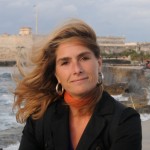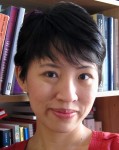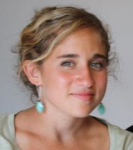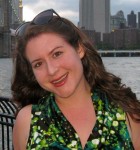Seminar on Temporalities
Mid-Career Faculty Fellows

amy.chazkel@qc.cuny.edu
Amy Chazkel is Associate Professor of History at Queens College and the CUNY Graduate Center. She is the author of Laws of Chance: Brazil’s Clandestine Lottery and the Making of Urban Public Life in Brazil (Duke University Press, 2011), co-winner of the J. Willard Hurst Prize of the Law and Society Association and recipient of Honorable Mention for the Best Book Prize of the Brazil Section of the Latin American Studies Association. Other publications include articles on the history of penal institutions and illicit gambling in modern Brazil and co-edited issues of the Radical History Review that explore the privatization of common property in global perspective and Haitian history. She has held faculty fellowships and visiting scholar positions at the Gilder Lehrman Center for the Study of Slavery, Resistance and Abolition at Yale, the David Rockefeller Center for Latin American Studies at Harvard, the Institute for Latin American Studies/ Center for Brazilian Studies at Columbia, and the Center for the Humanities and the Center for Place, Culture and Politics at CUNY. She currently serves as Co-Chair of the Radical History Review Editorial Collective. As CGSC faculty fellow, she will be working on a book project in progress that explores the social, cultural, and legal history of nighttime in nineteenth-century Rio de Janeiro.

duncan.faherty@qc.cuny.edu
Duncan Faherty is Associate Professor of English at Queens College and The Graduate Center, CUNY, and is also the Coordinator of the American Studies Certificate Program at The Graduate Center. He is also the co-organizer (with Kandice Chuh) of the Revolutionizing American Studies initiative at The Graduate Center. He is the author of Remodeling the Nation: The Architecture of American Identity, 1776-1858 (U of New England P, 2007) and co-editor of the journal Studies in American Fiction. His work has also appeared in such venues as Early American Literature, American Quarterly, and Reviews in American History. His current book project examines the development of the early U.S. novel by focusing on the canonical interregnum of 1800-1820, and rethinking the ways in which these texts interrogate Circum-Atlantic political and economic networks. This project is particularly interested in thinking about how U.S. cultural production indexes wide spread anxieties about the Haitian Revolution as a means of rethinking its own revolutionary legacies. He is also at work on a project about the War of 1812 and narrative temporalities. His research interests include Eighteenth-century American literature; early U.S. literature and culture (1780-1850); American Studies; and circum-Atlantic Studies.

nisrael@hunter.cuny.edu
Raised in Los Angeles, California, USA. Earned BA, UCLA, English, and Ph.D, Yale, English. Focus: Twentieth-century literature, visual art, and critical theory. First book, *Outlandish: Writing between Exile and Diaspora*, published by Stanford University Press i(2000). Has published over a dozen peer-reviewed essays (on Joseph Conrad, Theodor Adorno, Salman Rushdie, Wallace Stevens, and Samuel Beckett, and on questions concerning geography, globalization and ethics). Also published over 75 pieces on visual art (catalogue essays, previews and reviews for *Artforum* on contemporary art exhibitions, etc.).Current book project, *On Spirals: Metamorphosis of a Twentieth-Century Image,* under contract with Columbia University Press, focuses on the spiral as geopolitical and historical “image” in the sense Walter Benjamin gives to the term. Chapters on Italian Futurism and British Vorticism, WB Yeats and Vladimir Tatlin, James Joyce and Marcel Duchamp, and Beckett and Robert Smithson. Other forthcoming publications include two completed chapters in essay collections both currently at press—one on Beckett and Visual Art in the collection Beckett in Context (Cambridge UP, 2013) and one entitled “Re-envisioning Yeats’ Vision: Modernist Spirality and the Distribution of the Sensible” (Blackwell, 2013).Project for “Globalization and Temporality”: “The Recoiling of Global Modernity: Spirals in Literature and Art, 1989-2001, considers works by W.G. Sebald, William Kentridge, Melanie Smith and others.

john.maciuika@baruch.cuny.edu
John Maciuika is an associate professor of art and architectural history at the City University of New York, Baruch College, and the CUNY Graduate Center Ph.D. Program in Art History. His research focuses on the politics of modern architecture, design, and the applied arts in particular national and cultural contexts, particularly Germany, Austria, and the Baltic states. A recipient of fellowships from the DAAD (German Academic Exchange Service), the Alexander von Humboldt Foundation, and the NEH, Professor Maciuika is the author of the book, Before the Bauhaus: Architecture, Politics, and the German State, 1890-1920 (Cambridge University Press, 2005). He recently completed a three-year term as book review editor for modern architecture for the Journal of the Society of Architectural Historians, and another as president of the Society of Architectural Historians’ New York Metropolitan Chapter. He is currently at work on a book entitled Infrastructures of Memory: Historical Reconstruction and Cultural Heritage in Central and Eastern Europe.

kayrenee@gmail.com
Karen Miller is Associate Professor of History at LaGuardia Community College. Her book, Managing Inequality: Northern Racial Liberalism and Black Activism in Interwar Detroit, is forthcoming from NYU press. She has been a faculty fellow at the Center for Place, Culture, and Politics and the Center for Humanities at the CUNY Graduate Center, as well as a visiting scholar at the Eisenberg Institute for Historical Studies at the University of Michigan. Her current project , The Time Between the Colonial and the Postcolonial: Recasting Global and Local Inequalities during the Philippines’ Transition to Independence, focuses on the transition to independence in the Philippines, between 1934, when the U.S. Congress set a timetable for independence and July 4, 1946, when the Philippines became a legally sovereign nation. She examines this decade of transition as a temporal suspension: a time after colonial dependence, but before postcolonial independence.
Postdoctoral Fellows

marina.sitrin@gmail.com
Marina received her PhD in Global Sociology from Stony Brook University in 2011 and her JD in International Women’s Human Rights from CUNY Law School in 2001. She is the author of Horizontalism: Voices of Popular Power in Argentina (AK Press, 2006: Spanish edition Chilavert, 2005 Buenos Aires) and the forthcoming, with Zed Press, Everyday Revolutions: Horizontalism and Autonomy in Argentina. She has spent the past 5 years collaborating onInsurgent Democracies: Latin Americas New Powers, a book grounded in the voices of people in the various new movements, discussing the diverse paths towards power, democracy and social change. Her work focuses on social movements and justice, specifically looking at new forms of social organization, such as autogestión, horizontalidad, prefigurative politics and new affective social relationships. While much of her most recent published work has been on the contemporary social movements in Argentina, she has worked throughout the Americas, Caribbean and Japan. Her current research includes the global mass assembly movements (Greece, Spain and Egypt) and together with movement scholars and academics, examining what these movements might contribute to counter-hegemonic forms of globalization.
Dissertation Fellows

jcorby@gc.cuny.edu
Jennifer Corby is a doctoral candidate in the political science department at The CUNY Graduate Center. She is writing her dissertation on the temporalities evoked by—and the tensions between—modern political theory, modern political institutions, and lived reality. She is interested in questions about the forces that shape our perception of time, and the impact these perceptions have on the development of subjectivity and political agency. She is the co-founder and co-director of the Association for Critical Theory at The Graduate Center. Jennifer also teaches introductory and upper-level political philosophy courses at the City College of New York, where she was recently nominated by her department for the campus-wide Outstanding Teaching Award.

fiona.lee@gmail.com
Fiona Lee is a Ph.D Candidate in English at the City University of New York – The Graduate Center. Her research considers the impact of the Cold War on race and the formation of postcolonial Malaysia through an analysis of visual and literary representations of the Malayan Emergency. She has published review essays in Reviews in Cultural Theory; Interventions: International Journal of Postcolonial Studies; and Alphaville: Journal of Film and Screen Media. She is also an Instructional Technology Fellow at Macaulay Honors College (CUNY), where she works with faculty on integrating digital technology with pedagogy, as well as with students to develop web literacy.
Doctoral Student Fellows

dal-saleh@gc.cuny.edu
Danya Al-Saleh received her BA in Political Science from UC Berkeley. She has taught and studied in various educational institutions across California, Cairo, Egypt, and Doha, Qatar. Influenced by international struggles over education, her research interests include the globalization of universities, intellectual history, post-colonialism, and critical development studies, with an area focus on the Middle East.

jmahlbacher@gc.cuny.edu
Jessica Mahlbacher is a first year doctoral student in Political Science at the CUNY Graduate Center. She received her BA in History and Political Science from Fordham University, and her MPHIL in Development Studies from the University of Cambridge. Her research interests include how authoritarian regimes maintain legitimacy and assess public opinion, mobilization through social media and the Internet, how globalization affects information transaction costs, and the effect of Diaspora communities on national politics.


